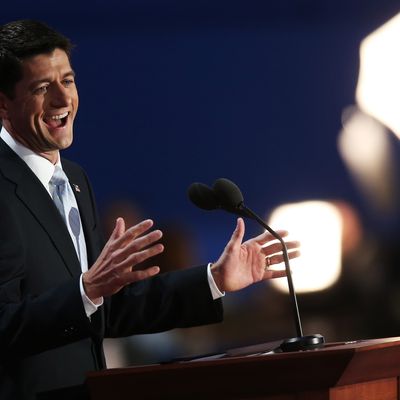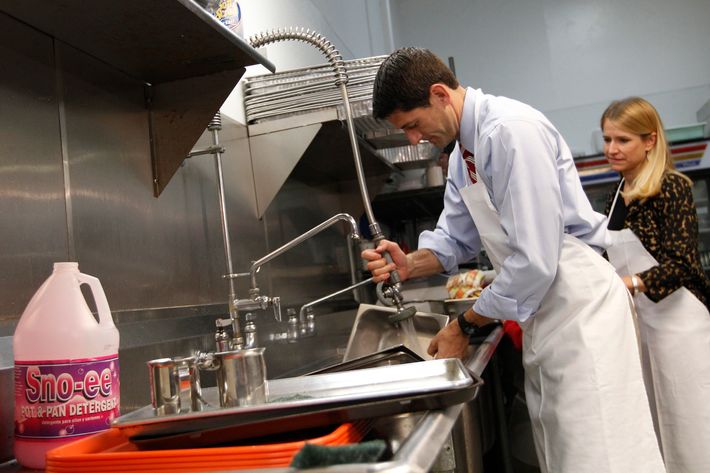
Paul Ryan’s flamboyantly low-key campaign to re-brand himself from an Ayn Rand miser to Jack Kemp-esque lover of the poor was supposed to culminate in the unveiling of a House Republican budget at some as-yet undefined moment later this year. “As a direct counter to President Obama’s recent emphasis on the gap between rich and poor,” the Washington Post reported earlier this month, “the upcoming House Republican budget will focus on welfare reform and recommend a sweeping overhaul of social programs, including Head Start and Medicaid.” At last, Ryan’s much-ballyhooed new ideas for helping the poor would find concrete budgetary expression, because if there’s one thing the world knows about Paul Ryan, it’s that he’s a hard-core wonk with no tolerance for fudging.
Okay. You know what’s coming next, right? Right:
But the plan is not likely to contain an explicit, comprehensive welfare overhaul proposal growing out of an anti-poverty report that Ryan issued earlier this month. Ryan wants to introduce some poverty related initiatives later this year.
That little nugget comes via a subscription-only report on Republican thinking about the budget posted Friday evening in Congressional Quarterly. It’s in the 25th paragraph. This is in keeping with the post-election Republican pattern, in which promises of reform and policy innovation are announced with great fanfare, then withdrawn silently in the dead of night.
The disintegration of Ryan’s promise reveals something very deep. It’s not that he needs a little more time and a few all-nighters, or some more help getting fellow Republicans in line. His policy vision is fundamentally impossible.
Ryan and his party are committed to the following beliefs:
- America faces an impending debt crisis, somewhere, which requires a balanced budget within the next decade;
- Social Security and Medicare benefits for current and near-retirees amount to a sacred pact that cannot be violated;
- Barack Obama has hollowed out the military, requiring defense spending to rise (as Ryan proposes), or at minimum not to drop;
- Taxes can never, ever, ever rise at all, even as part of a trade for other desirable policy changes.
The only possible way to reconcile this combination of policy commitments is to impose staggering cuts to programs for the poor, which Ryan’s most recent budget proposal does. Every previous version of the Ryan budget is, basically, a plan to cut benefits for the poor. At least two thirds of the cuts in last year’s Ryan plan come from programs for poor people.

Since last year, two new developments have actually made the dilemma even more acute. First, the Congressional Budget Office adopted more pessimistic assumptions about economic growth, and thus projected lower tax revenue, which requires Ryan to find more cuts to make his numbers add up. And since he refuses to cut anything other than programs for poor people, he needs to cut even farther this year than last.
The second problem is that imposing greater levels of pain on the poor has become politically inconvenient for Ryan and his party. Thus his great lengths to associate himself with the downtrodden. This also motivated Ryan’s recent grand review of federal anti-poverty spending, which he presented as an attempt to summarize the research about what works and what doesn’t. Ryan’s report, even though it used selective, one-sided methods to indict the safety net, still fails to justify the kinds of slashing cuts his fiscal commitments entail.
Ryan and his colleagues have devoted a lot of rhetorical attention to the 47 percent, or the “takers,” and the corresponding need to stop letting them take stuff. Ryan wants it to be known that he does not personally have anything against the takers. And, who knows — maybe he doesn’t. But even if you were to exterminate every wisp of anti-taker hostility within the party, what would remain behind is not love but disinterest. He and his party will always care about low taxes and high defense spending more.
That’s why Ryan is going to postpone his innovative, new, reform-y ideas until after this year’s version of the budget comes out, and issue them some time in the future as “poverty related initiatives.” The budget is a way of reconciling your various commitments. Ryan’s commitments are fundamentally irreconcilable. He wants to propose nice-sounding things for poor people without explaining what he would give up to make them happen. That is to say, once again Paul Ryan’s account of his intentions probably should not be taken at face value.






























